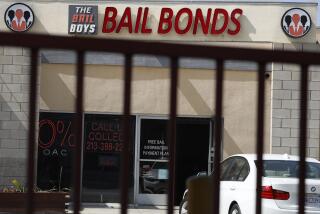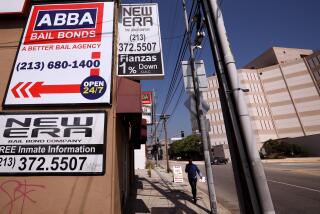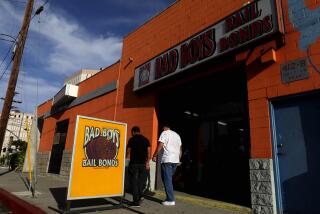High Court Refuses to Hear Keating’s Appeal on Bail
- Share via
The California Supreme Court declined Wednesday to hear an appeal from Charles H. Keating Jr., the former thrift owner now in Los Angeles County Jail on fraud charges, to lift or reduce his $5-million bail.
Without comment, Chief Justice Malcolm M. Lucas signed an order that simply denied Keating’s petition. Only two of the court’s seven justices--Stanley Mosk and Edward A. Panelli--voted to grant a hearing on the petition.
Keating’s lawyers could not be reached for comment late Wednesday. But they indicated earlier that they would take the bail issue to federal court--most likely U.S. District Court in Los Angeles--should the state’s high court reject the petition.
His lawyers also could ask Los Angeles County Superior Court Judge Lance A. Ito, the trial-court judge recently assigned the case, to lower bail. Keating and three co-defendants are scheduled to appear Monday before Ito to settle some procedural matters.
Keating, former chairman of American Continental Corp. in Phoenix, has been in jail since Sept. 18, when a grand jury indictment was unsealed in court. The indictment charges Keating and the others with 42 counts of securities fraud in the sale of American Continental junk bonds through the 29 Southern California branches of the company’s main subsidiary, Lincoln Savings & Loan in Irvine.
More than 17,000 people, mainly elderly depositors at Lincoln, invested nearly $200 million in American Continental bonds during a two-year period ending in early 1989. Many said they moved their insured deposits over to securities accounts at Lincoln because they were misled into believing that the bonds were safe and insured.
Those bonds have become worthless since the company filed for bankruptcy protection in April, 1989. Regulators, who seized Lincoln immediately thereafter, now estimate that it is one of the worst thrift disasters ever and will cost U.S. taxpayers more than $2 billion.
Though the Los Angeles County district attorney’s office originally made no recommendation on bail, Superior Court Judge Gary Klausner set a $5-million bond for Keating. The high bail stunned Keating and his family. Keating said he is broke and cannot pay the bail. And his attorneys have argued that his imprisonment will make preparation of his defense more difficult.
Klausner, however, rejected arguments to lower the bail, citing the seriousness of the charges and the danger that Keating would flee. Keating is the subject of numerous civil and criminal investigations. A state appeals court also rejected a petition to lower bail.
However, some prosecutors and law enforcement officials have said that they consider the bail excessive. Had Keating been charged in federal court, one federal agent said, he likely would have been released on his own recognizance--essentially on his word that he would return.
“It’s possible that the U.S. courts will do something with this, but I wouldn’t be surprised if they didn’t,” said Caleb Foote, a retired UC Berkeley law school professor.
Foote, a criminal-law expert and author of a book on bail, said that the bail rule is intended to allow defendants charged with serious crimes, but not convicted, to be released. Now, he said, that rule is often not followed, and the result is a severe clogging of the nation’s jails.
“The U.S. Supreme Court has allowed a level of (acceptable) bail to build up that is just way out of line,” he said. “The court has essentially deprived defendants of that clause in the 8th Amendment that says excessive bail should not be required.”
More to Read
Sign up for Essential California
The most important California stories and recommendations in your inbox every morning.
You may occasionally receive promotional content from the Los Angeles Times.










